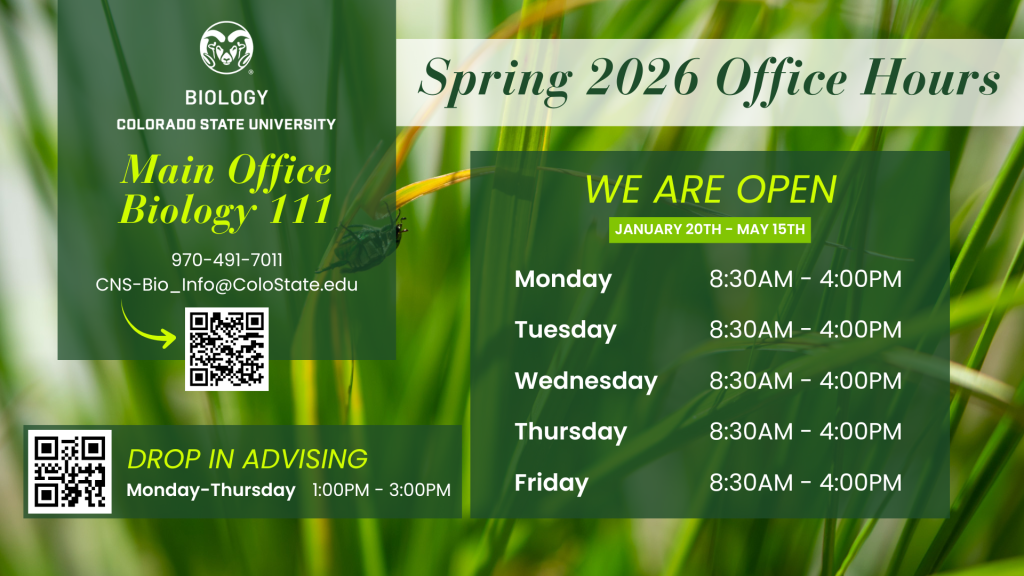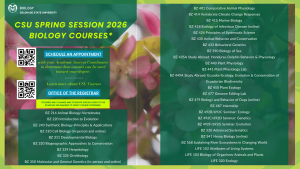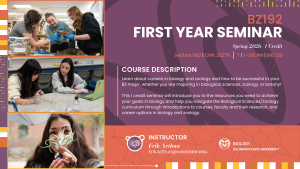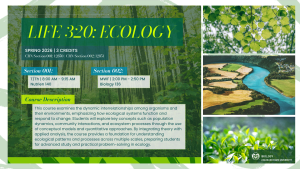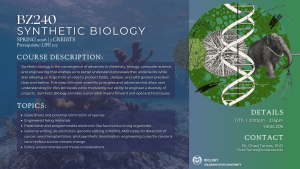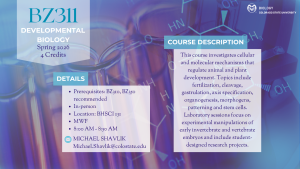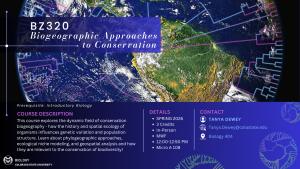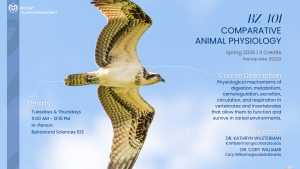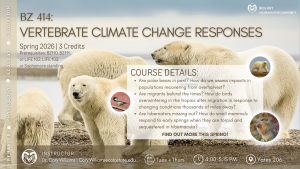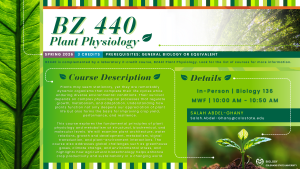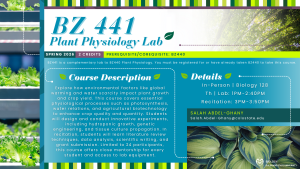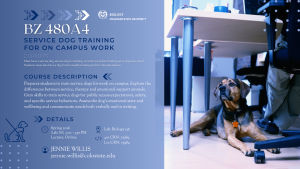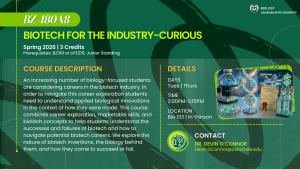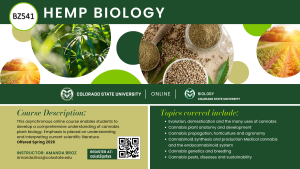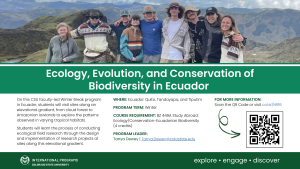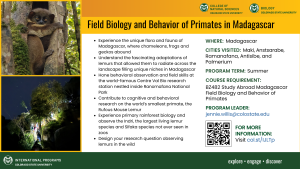Department of Biology Resources + Information: biology.colostate.edu/resources-guidelines/
Events, Dates, + Deadlines: biology.colostate.edu/dates-deadlines/
Main Office Contact Information: Monday – Friday | 7:30am – 4:30pm | CNS-Bio_Info@colostate.edu | 970-491-7011
Spring 2026 Office Hours: January 5th – May 15th | Monday – Friday | 8:30am – 4:00pm
Spring 2026 ASC Drop In Hours: January 26th – May 15th | Monday – Thursday | 1:00pm – 3:00pm
Welcome to the
Department of Biology at Colorado State University
Our internationally-recognized research and education programs focus on organisms, diving into mechanistic detail about how they work, or stepping back to consider how they interact with each other and with their environment. From cells to the biosphere, we make discoveries about fundamental questions in Biology, and we use this new knowledge to make the world a better place. CSU Biology is a place where everyone is welcome to indulge their curiosity about the living world.
Student Highlights
Marissa Martinez’s stay-curious energy earned her a feature in @natgeotv’s new show, “Science Fair: The Series,” and propelled her all the way to the International Science and Engineering Fair, securing her a full-ride scholarship through the @boettcherfdn to study biology right here at @CSUNaturalSciences 📚🥼
Catch #ScienceFairTheSeries on @hulu and @disneyplus, out now 📺 👀
“Biology graduate student promotes importance of self in lab”
by Allie Ruckman, featuring Mel Morado

“Recognizing and addressing oppression in the sciences”
by Allie Ruckman, featuring Marina Rodriguez, Amir Alayoubi, and Beth Wittmann

“Q&A with Boettcher Scholar and International Science and Engineering Fair participant”
by Allie Ruckman, featuring Marissa Martinez

“Amphibian Week Highlights Critical Conservation Research at CSU”
by Elizabeth Rylance, featuring grad student, Katherine Stroh, & Biology professors, Chris Funk, and Rachel Mueller

Program Highlights
The Biology Teaching Collections
The Department of Biology houses the Biology Teaching Collections. The program maintains a large collection of specimens that we use in our classes. There are over 13,000 specimens, including birds, mammals, reptiles, amphibians, representatives of most invertebrate groups, and plants of all kinds. This collection has been an important part of instruction for the past century and is being reorganized to help better serve this purpose through volunteers.
Interested in volunteering or seeing the collections? Contact Tanya Dewey (tdewey@rams.colostate.edu) or Jennifer Brady (jbrady94@rams.colostate.edu) for more information on getting involved. This program showcases the amazing volunteers, graduate students and professors who are part of keeping this collection thriving. Joining as a volunteer includes learning what we do to keep this place running while also discussing what the collections are all about.
Video Credits
Music: Summer Somewhere In Cuba | Artist: Cumbia Deli | Videography: CSU Natural Sciences | YouTube: col.st/Ywk5i
Course Highlights
Course Snapshots
LIFE 102 – Attributes of Living Systems
This course is an introductory biology course that works well for both incoming Freshmen and outgoing Seniors. It not only provides a basis for more-advanced courses in life sciences, but also serves as an effective review for more-advanced students.
BZ192 – First Year Seminar
Embark on an exciting journey into the life sciences with this dynamic course, it’s your chance to explore biology and zoology like never before! Connect with passionate faculty mentors, dive into research opportunities, and uncover the pathways that will shape your academic and professional future.
BZ220 – Introduction to Evolution
Learn how to communicate science to your friends, family, and the wider society in ways that make it feel exciting and important.
BZ240 – Synthetic Biology: Principles & Applications
Where science meets innovation. Ready to explore the future of biology? Dive into the cutting-edge world of synthetic biology, where engineering meets life itself. From gene drives and de-extinction to programmable cells and climate-resilient corals, this course tackles the science behind tomorrow’s breakthroughs—plus the ethical questions we must ask today.
BZ311 – Developmental Biology
The details of life are important. Join us in developmental biology, where we discuss how organisms form.
BZ320 – Biographic Approaches to Conservation
This is an opportunity to learn about the dynamic field of conservation biogeography!
BZ390 – Biology of Sex
What is sex and how do we know? Explore the evolutionary, genetic, and behavioral foundations of biological sex across the animal kingdom—and beyond. Challenge your understanding in this thought-provoking journey from chromosomes to courtship.
BZ401 – Comparative Animal Physiology
How do animals work? What allows whales to dive deep, or birds to fly high? Learn about animal extremes and how their physiology shapes what they can do!
BZ414 – Vertebrate Climate Change Responses
This course is designed to help students understand the impacts of climate change on our planet’s animals.
BZ415 – Marine Biology
This course explores marine life from the microscopic single cell organisms to the largest whales and describes how they are all connected.
BZ424/520 – Principles of Advanced Systematics / Advanced Systematics
Students interested in developing and evaluating phylogenetic hypotheses and the many real-world applications of systematic science should consider this course, which allows them to develop research skills relevant to evolutionary biology.
BZ440 – Plant Physiology
Who is this course for?
- Students who are interested in understanding carious facets of plant functions at cellular, organellar, and whole plant level during its life time.
- Students who also want to learn various physiological aspects at the molecular level and how these processes regulate the plants’ response to changing environments conditions which in turn influences their growth and productivity.
- The main target groups are upper-division undergraduate students with backgrounds/career interests in Biology, Horticulture, Soil and Crop Science, Forestry, Rangeland Ecology, and related areas. Graduate students conducting research in similar fields are also welcome.
- Those students who want to pursue plant research related jobs in the private sector, federal and state institutions are encouraged to enroll as this course fulfils their basic requirements.
BZ479 – Biology and Behavior of Dogs (online)
Decode the science behind your best friend! Ever wondered why dogs do what they do? This fully online, asynchronous course dives into the fascinating world of canine behavior through the lens of physiology, genetics, development, and evolution. Explore how domestication and selective breeding shape the minds and instincts of our furry companions—and their wild canid cousins.
BZ480A4 – Service Dog Training for on Campus Work (online and in-person)
Want to make a real impact while learning unique skills? This course prepares you to train service dogs for public access and campus environments. You’ll explore the differences between service, therapy, and emotional support animals, and learn how to assess and support a dog’s emotional wellbeing. This hands-on course gives you practical experience and communication skills that set you apart. If you have a dog and want to dive into a rewarding field, add this to your schedule!
BZ480A8 – Biotech for the Industry-Curious
Explore biotech careers while learning applied biological innovations and how they were made. This course combines marketable skills with real-world biotech concepts to help you navigate the industry successfully.
BZ541 – Hemp Biology (online)
Explore the science behind cannabis. Curious about the biology of one of the world’s most versatile plants? This asynchronous online course dives deep into the science of cannabis—from its evolution and anatomy to cannabinoid production and medical applications. Learn how genetics, horticulture, and sustainability shape the future of hemp and cannabis research.
BZ692A.003 – The Distracted Student and What to Do About It
In this course, you’ll explore proven strategies to capture attention, foster curiosity, and build a sense of community, skills that translate directly into better teaching and learning outcomes. If you’re preparing for a career in academia or want to strengthen your teaching toolkit, this course offers actionable insights you can apply immediately.
Course Snapshots
LIFE 102 – Attributes of Living Systems
This course is an introductory biology course that works well for both incoming Freshmen and outgoing Seniors. It not only provides a basis for more-advanced courses in life sciences, but also serves as an effective review for more-advanced students.
BZ220 – Introduction to Evolution
NEW Online! Learn how to communicate science to your friends, family, and the wider society in ways that make it feel exciting and important.
BZ223 – Plant Identification
With the ecological and environmental issues we are facing as a society, plant Identification skills are more important than ever. Learn how to identify flowering plants in a way that will serve you no matter where you live/work in the future!
BZ300 – Animal Behavior
For anyone interested in understanding how and why animals do what they do!
BZ492 and BZ692 – Recognizing and Addressing Oppression in the Sciences
Go beyond surface level conversations about equity and inclusion in the sciences by taking a critical lens to science history and critiquing the systems that perpetuate harm.
BZ544 – Effective Scientific Presentations
Learn how to communicate science to your friends, family, and the wider society in ways that make it feel exciting and important.
BZ572 – Phytoremediation
Our planet faces numerous environmental risks stemming from industrial development, including mining, gas emissions, chemical fertilizers, pesticide applications, and municipal waste generation. The accumulation of these contaminants in soil, water, and air harms plants, animals, humans, and the environment. Various strategies, such as chemical-based, physicochemical, and biological methods, have been employed to remediate these pollutants. Among these, the biological methods, especially phytoremediation, are the most accepted strategy because they are energy efficient, cost-effective, and eco-friendly. It is important to understand the sources of different pollutants and how we can reduce their accumulation at both the generation and decontamination levels. In this course, we will cover the different types of pollutants and their sources, the various strategies to remediate them, and the pros and cons of each approach with emphasis on bioremediation. This limited seats, 3-credit course will provide each student with the opportunity to practice searching databases, preparing reports or reviews, creating presentations, presenting to a group, and participating in scientific discussions in addition to acquiring knowledge about the course subject. Graduate and undergraduate students from biology, horticulture, soil and crop science, forestry, ecology, chemistry, and engineering will benefit from this course.
Course Snapshots
LIFE 102 – Attributes of Living Systems
This course is an introductory biology course that works well for both incoming Freshmen and outgoing Seniors. It not only provides a basis for more-advanced courses in life sciences, but also serves as an effective review for more-advanced students.
BZ223 – Plant Identification
With the ecological and environmental issues we are facing as a society, plant Identification skills are more important than ever. Learn how to identify flowering plants in a way that will serve you no matter where you live/work in the future!
BZ311 – Developmental Biology
The details of life are important. Join us in developmental biology, where we discuss how organisms form.
BZ339 Section 001 – Field Methods in Grassland Ecosystem Ecology
Develop field skills used in research on challenges facing grassland ecosystems in this intensive summer course. You will come away with perspectives on the structure of research and the process of collecting data in the field.
BZ339 Section 002 – Methods in Habitat and Species Diversity Assessment
This course will explore the diverse field methods of assessing habitat types and species diversity by combining classroom learning and practical applications of field research in the great outdoors. Students will apply these techniques at designated field sites in and around Fort Collins, where they will evaluate habitat characteristics and the associated flora and fauna. Additionally, students will develop their own research proposals, drawing from their field experiences to design meaningful ecological studies. This course offers a rigorous yet engaging introduction to the many ways scientists observe and conduct research on animals and plants in their natural environments.
BZ350-801 – Molecular & General Genetics
Because this course is online and asynchronous, it is a great option for students who have a summer job or internship and can’t take an in person class.
Our Education Abroad programs are as diverse as they are enticing! Check out our programs and learn more about these incredible opportunities here: CSU | Education Abroad | Recommended CNS Programs Abroad
Learn more about CSU’s Education Abroad Programs here: CSU | Education Abroad
Speak with an advisor to see if these programs are right for you!: CSU | Biology | Advising
Application Deadlines
Behavior and Biology of African Mammals in Kenya: Summer Break – APPLY
- Early Deadline: December 1st
- Final Deadline: December 15th
Dolphin Behavior & Physiology in Honduras: Winter & Summer Break – APPLY
-
Winter
- Priority Deadline: May 1st
- Final Deadline: September 15th
-
Summer
- Priority Deadline: December 1st
- Final Deadline: February 1st
Ecology, Evolution, & Conservation of Biodiversity in Ecuador: Winter Break – APPLY
- Priority Deadline: May 1st
- Final Deadline: September 15th
Field Biology & Behavior of Primates in Madagascar: Summer Break – APPLY
- Priority Deadline: December 1st
- Final Deadline: February 1st
First Year Seminar Abroad: Biology in Australia: August – APPLY
- Priority Deadline: April 1st
- Final Deadline: May 4th
Marine Biology in Mexico: Fall Break – APPLY
- Early Deadline: March 1st
- Final Deadline: April 15th
Class Highlights
A successful specimen prep day! These ground squirrels are ready to be used for instruction in BZ330: Mammalogy. Keep an eye out for these specimens in our teaching collection.
Learn more about specimen prep here: YouTube | Museum Prep 101
Warning: The linked video explains the process of preparing museum specimens. The content may be considered graphic by some.
“Pursuing new educational frontiers” – by Allie Ruckman, Elements
A brand-new course in the Department of Biology, Behavior and Biology of African Mammals, brought 16 students to Kenya summer 2023 to practice fieldwork and observational skills in an environment very unlike that of Northern Colorado.
Support + Resources
News
Legacy lives on through moss donation
Holmes Rolston III, University Distinguished Professor and professor Emeritus in the Department of Philosophy at Colorado State University, is widely known as a founding father of environmental ethics as a formal study, but in his personal life he was known as a man with a deep interest in moss. Over the course of his life, Rolston collected approximately 2,000 moss specimens, which upon his passing, have been donated to the Charles Maurer Herbarium at Colorado State University.
Jan. 21 is National Squirrel Day: Learn fun facts about our favorite critters
In honor of National Squirrel Appreciation Day on Jan. 21, two CSU squirrel experts shared some fun facts based on their research.
Ecovoltaics: How solar panels benefit Colorado grasslands and achieve state energy goals
As a grassland ecologist, Colorado State University Distinguished Professor Alan Knapp is interested in how the study of ecovoltaics can not only help Colorado achieve its renewable energy goals but also improve the conditions of its grasslands.
Biology department hosting Halloween events Friday, Oct. 31
The Department of Biology is hosting some eerie events on Friday, Oct. 31, in honor of Halloween.
Calendar
Features
Seminars
Find Us
DEPARTMENT OF BIOLOGY
Colorado State University
Biology Building, Room 111
1878 Campus Delivery
Fort Collins, CO 80523
Telephone: 970-491-7011
Fax: 970-491-0649
Email: CNS-Bio_Info@colostate.edu
